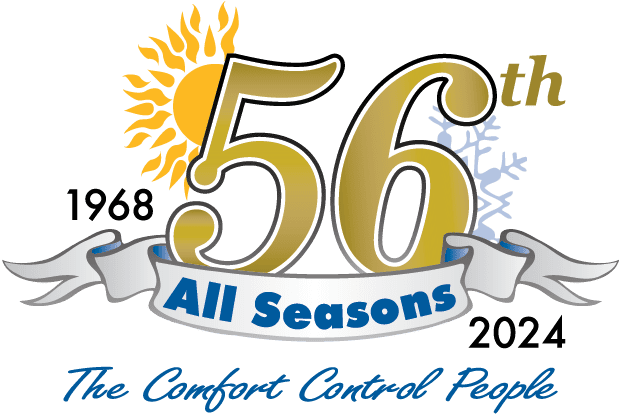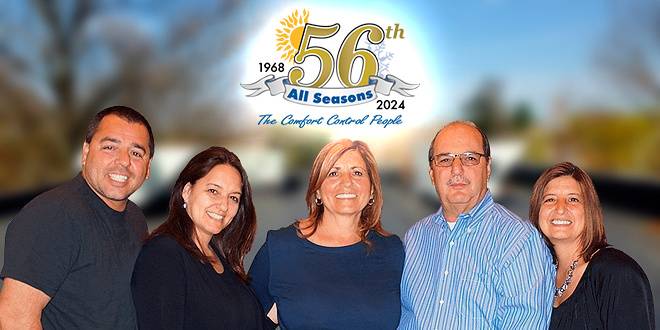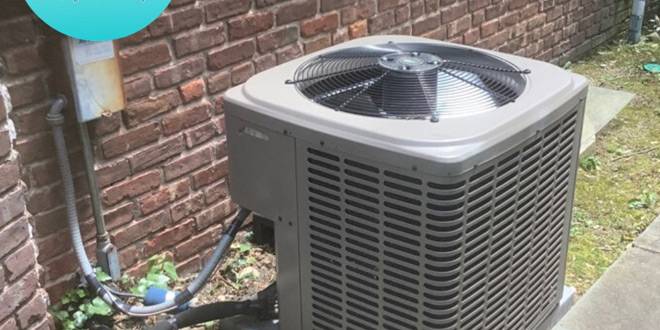
When the summer heat is at its peak, the last thing you want is an air conditioning unit that can’t keep up. An overheating outdoor unit can lead to inefficient cooling, increased energy bills, and potential damage to your system. Understanding how to prevent and address this issue can save you time, money, and discomfort. At All Seasons Air Conditioning, we’re committed to helping you keep your home cool and comfortable. This guide will walk you through the causes of AC outdoor unit overheating and provide practical solutions to maintain your unit’s efficiency.
Key Points Covered
- Causes of outdoor unit overheating
- Signs of an overheating outdoor unit
- Steps to prevent overheating
- Maintenance tips to keep your AC unit running smoothly
- Importance of professional maintenance and repair
Glossary of Terms
- Compressor: The component of the AC system that compresses refrigerant and circulates it through the system.
- Condenser Coil: A coil that cools and condenses refrigerant vapor into a liquid.
- Refrigerant: A fluid used in AC systems to transfer heat.
- Heat Exchanger: A device that transfers heat between two or more fluids.
- Fan Motor: Powers the fan that blows air over the condenser coils to dissipate heat.
Common Causes and Solutions for Overheating
| Cause | Solution |
| Debris Buildup | Regularly clean the area around the unit. |
| Refrigerant Leaks | Have a professional check and refill the refrigerant. |
| Electrical Issues | Inspect and replace faulty wiring or components. |
| Poor Airflow | Ensure vents are clear and clean. |
| Dirty Coils | Schedule professional cleaning and maintenance. |
Causes of Outdoor Unit Overheating
An AC outdoor unit can overheat for several reasons. Debris buildup is one of the most common culprits, as leaves, dirt, and other particles can obstruct airflow and force the system to work harder than necessary. For example, if leaves accumulate around the unit, they can block the vents, leading to restricted airflow and increased operational strain. Regularly checking and clearing debris can significantly enhance your system’s performance.
Refrigerant leaks can also cause overheating by preventing the system from effectively cooling the air. If the refrigerant levels are too low, the compressor will work harder to cool the air, leading to overheating. This not only reduces the system’s efficiency but can also damage the compressor, resulting in costly repairs.
Electrical issues, such as faulty wiring or a failing capacitor, can lead to insufficient power supply and increased system strain. For instance, a malfunctioning capacitor can prevent the compressor and fan from operating correctly, causing the system to overheat.
Lastly, poor airflow resulting from blocked vents or dirty coils can significantly impact your unit’s efficiency, causing it to overheat and underperform. Dust and dirt accumulation on the condenser coils reduce their ability to dissipate heat, forcing the system to run longer and overheat. Ensuring your coils are clean and your vents are unobstructed can prevent many overheating issues.

Signs Your Outdoor Unit is Overheating
Recognizing the signs of an overheating outdoor unit can help you take action before more severe problems occur. Common indicators include noisy operation, as the system struggles to function properly. You may hear unusual grinding, buzzing, or humming sounds coming from the unit, which can indicate that the compressor is working harder than it should be.
You may also notice frequent cycling on and off, which can signal that the unit is overworking to maintain the desired temperature. Short cycling occurs when the AC turns on and off rapidly without completing a full cooling cycle, causing excessive wear and tear on the system and increasing energy consumption.
If you feel warm air blowing from your vents when the AC is on, this could also be a sign of an overheating unit. Inconsistent cooling performance often indicates that the outdoor unit is struggling to cool the air effectively due to overheating.
Addressing these issues promptly can prevent further damage and keep your home cool and comfortable.
Steps to Prevent Overheating
Preventing your AC outdoor unit from overheating involves regular maintenance and attention to detail. Start by ensuring the area around your unit is clean and free of debris, as this will allow for optimal airflow. Clear leaves, grass, and dirt from the vicinity, and trim any overgrown vegetation that could impede airflow.
Check your system’s refrigerant levels regularly, as low refrigerant can lead to overheating. If you suspect a leak or notice your AC isn’t cooling as efficiently, it’s essential to contact a professional to assess and refill the refrigerant.
Ensure your AC system has proper airflow by keeping vents and ducts clear and unobstructed. Check your home’s air filters monthly and replace them as needed to ensure they don’t become clogged with dust and debris, which can restrict airflow.
Additionally, scheduling regular AC maintenance with All Seasons Air Conditioning can help identify potential issues before they become significant problems, ensuring your system runs smoothly throughout the summer. Our expert technicians can perform thorough inspections, clean coils, check electrical connections, and ensure all components are functioning optimally.
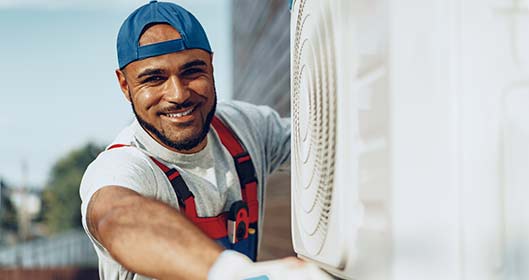
Maintenance Tips to Keep Your AC Unit Running Smoothly
Keeping your AC unit in top condition involves a mix of professional and DIY maintenance tasks. Schedule professional inspections to ensure all components are functioning correctly and to catch potential problems early. A professional technician can assess the overall health of your unit, identify worn or damaged parts, and perform necessary repairs or replacements.
Change your air filters regularly to prevent dust and debris from clogging your system and affecting airflow. A clean filter improves air quality, enhances airflow, and reduces the workload on your AC unit.
Consider investing in indoor air quality solutions, such as air purifiers or humidifiers, to reduce the strain on your AC unit and improve overall comfort. These systems can work in tandem with your AC to maintain ideal indoor conditions and reduce allergens and pollutants.
By staying proactive with maintenance, you can extend the lifespan of your AC system and enhance its efficiency. Regular maintenance not only prevents overheating but also improves energy efficiency, which can significantly reduce your utility bills over time.
Fun Facts About Air Conditioning
- Air conditioning was first invented in 1902 by Willis Carrier, initially designed to control humidity in a printing plant. This innovation revolutionized the printing industry by stabilizing the paper’s dimensions and ink alignment.
- The term “air conditioning” was coined by a North Carolina textile mill manager named Stuart W. Cramer. Cramer used it to describe the process of controlling humidity and temperature to improve the quality of textile production.
- In 1931, H.H. Schultz and J.Q. Sherman filed a patent for the first individual room air conditioner. This innovation made air conditioning accessible to residential customers and laid the foundation for modern home comfort systems.
- Movie theaters were among the first public spaces to use air conditioning, which led to the tradition of the summer blockbuster as people flocked to cool theaters. This marketing strategy capitalized on the appeal of cool, comfortable spaces during the hottest months of the year.
- Air conditioning has played a crucial role in technology, from preserving computer systems to enabling the manufacturing of complex electronics. Reliable climate control is essential for maintaining optimal operating conditions for sensitive equipment.
FAQ Section
1. What causes an AC outdoor unit to overheat?
Common causes include debris buildup, refrigerant leaks, electrical issues, and poor airflow.
2. How can I tell if my outdoor unit is overheating?
Signs include noisy operation, frequent cycling, and warm air blowing from vents.
3. Can I prevent my AC unit from overheating myself?
Yes, regular cleaning, checking refrigerant levels, and ensuring proper airflow can help, but professional maintenance is recommended.
4. How often should I schedule professional maintenance for my AC unit?
It’s best to have your AC system inspected and maintained at least once a year, ideally before the start of the cooling season.
5. What should I do if my AC unit is overheating?
Turn off the system and contact a professional for inspection and repair to prevent further damage.
6. Why does my AC unit keep shutting off?
This could be due to short cycling, often caused by overheating, electrical issues, or thermostat problems. Have a technician assess the system for potential issues.
7. How does low refrigerant affect my AC’s performance?
Low refrigerant can cause the system to work harder, leading to overheating, reduced cooling capacity, and potential damage to the compressor.
8. Is it normal for my AC to run constantly during hot weather?
While it might run longer during extreme heat, constant operation can indicate an issue like an overheating unit, undersized system, or poor insulation. A professional evaluation can help determine the cause.
9. What maintenance tasks can I do myself?
Regularly clean the area around the outdoor unit, replace air filters, and ensure vents are unobstructed to promote efficient airflow.
10. How can indoor air quality products benefit my AC system?
Air purifiers and humidifiers can reduce pollutants and humidity levels, improving air quality and reducing the workload on your AC system, enhancing its efficiency and lifespan.
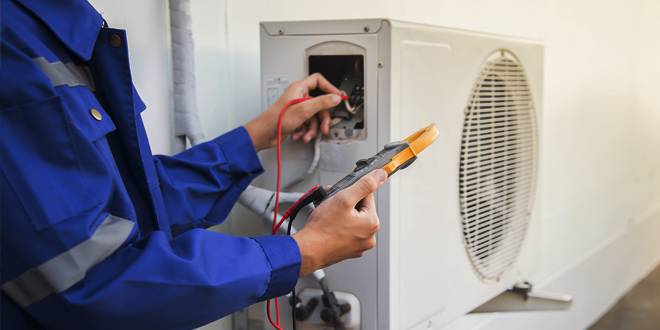
Stay Cool with All Seasons Air Conditioning
Keeping your outdoor AC unit from overheating is crucial for efficient cooling and comfort during the hot months. By understanding the causes, recognizing the signs, and implementing preventive measures, you can ensure your system runs smoothly and efficiently. At All Seasons Air Conditioning, we offer a range of services, from AC installation and AC repair to AC maintenance, to keep your home comfortable year-round. If you’re experiencing issues with your AC system or want to learn more about our services and specials, don’t hesitate to contact us. Our team of experienced professionals is ready to help you stay cool and comfortable all season long.
